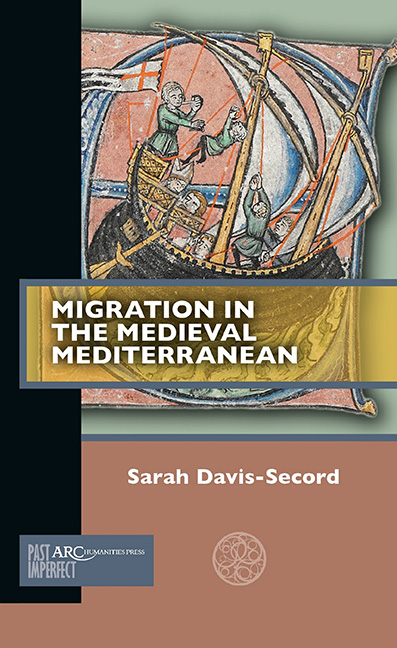Book contents
- Frontmatter
- Contents
- Introduction
- Chapter 1 Refugees from the Islamic Conquests
- Chapter 2 Hadrian and Theodore
- Chapter 3 St. Elias the Younger
- Chapter 4 Constantine the African
- Chapter 5 Jewish Refugees from the Norman Invasion
- Chapter 6 Merchants
- Chapter 7 Imam al-Mazari and Other Muslim Scholars
- Chapter 8 Unnamed Sicilian Girl
- Chapter 9 George of Antioch and Other Immigrants to Sicily
- Chapter 10 Moses Maimonides
- Chapter 11 Religious Converts
- Conclusion
- Further Reading
Chapter 4 - Constantine the African
Published online by Cambridge University Press: 13 January 2022
- Frontmatter
- Contents
- Introduction
- Chapter 1 Refugees from the Islamic Conquests
- Chapter 2 Hadrian and Theodore
- Chapter 3 St. Elias the Younger
- Chapter 4 Constantine the African
- Chapter 5 Jewish Refugees from the Norman Invasion
- Chapter 6 Merchants
- Chapter 7 Imam al-Mazari and Other Muslim Scholars
- Chapter 8 Unnamed Sicilian Girl
- Chapter 9 George of Antioch and Other Immigrants to Sicily
- Chapter 10 Moses Maimonides
- Chapter 11 Religious Converts
- Conclusion
- Further Reading
Summary
Just as migrants like Theodore and Hadrian enriched the intellectual and religious cultures of early medieval England, and like Elias participated in both pilgrimages and educational travel, another émigré from across the Mediterranean was a key figure in the development of early medieval medical and scientific knowledge in Europe. Without the influence of Constantine, known as “the African,” early medieval Christian medical science would have been far more impoverished than it was. He introduced texts, ideas, and scientific knowledge that were unavailable and unknown by the Latins, translating a long list of books from Arabic that became central to the scientific study of medicine in the early medieval Latinate world. Constantine produced at least twenty-four and perhaps as many as thirty-four translations, all from Arabic into Latin, thus greatly enhancing early medieval knowledge about the human body, its ailments, and how to treat them.
Like many of our other migrants, much of Constantine's life is obscured by omissions or fabrications in the existing sources. For instance, we do not know Constantine's ethnic origin, although we are fairly positive that he was born in Ifriqiya. Was he a descendent of Greeks or Copts who remained in Muslim northern Africa, or from an Arab or Ama zigh family? Was “Constantine” even his birth name, or one he adopted upon baptism into the Christian religion? All we know is that his African origin was important enough to be attached to his name and his biography, and that it was a significant aspect of his self-presentation. Several of the texts he produced include the authorial autobiography “Ego Constantinus africanus montis cassinensis monacus” (I, Constantine the African, monk of Monte Cassino). We also know that his native language was Arabic and that he was well-versed in medical knowledge before his arrival in Italy.
Likewise, sources differ about the religion of his birth family, although we know that he ended his life as a monk at the Latin Christian Abbey of Monte Cassino, in southern Italy. This may well be a story of religious conversion as well as cross-cultural migration. Or, perhaps, he may have been born into an Arabic-speaking Christian community in northern Africa. Two of the biographies we have for him suggest that he had been born a Muslim.
- Type
- Chapter
- Information
- Migration in the Medieval Mediterranean , pp. 37 - 44Publisher: Amsterdam University PressPrint publication year: 2021



